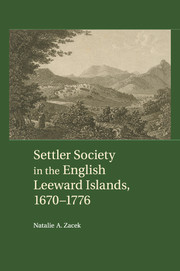Book contents
- Frontmatter
- Contents
- List of Tables
- Acknowledgments
- Map
- Settler Society in the English Leeward Islands, 1670–1776
- Introduction
- 1 The Challenges of English Settlement in the Leewards
- 2 Irish, Scots, and English
- 3 Managing Religious Diversity
- 4 Sex, Sexuality, and Social Control
- 5 Political Culture, Cooperation, and Conflict
- Conclusion
- Bibliography
- Index
5 - Political Culture, Cooperation, and Conflict
Published online by Cambridge University Press: 05 July 2011
- Frontmatter
- Contents
- List of Tables
- Acknowledgments
- Map
- Settler Society in the English Leeward Islands, 1670–1776
- Introduction
- 1 The Challenges of English Settlement in the Leewards
- 2 Irish, Scots, and English
- 3 Managing Religious Diversity
- 4 Sex, Sexuality, and Social Control
- 5 Political Culture, Cooperation, and Conflict
- Conclusion
- Bibliography
- Index
Summary
INTRODUCTION
From the onset of English settlement until 1670, the Leeward Islands were governed by Barbados – essentially as a colony of a colony – and they achieved their independence as a result of years of lobbying, during which they claimed that the Barbadian colonists were concerned only with their own security and prosperity, to the disadvantage of that of their fellow English settlers in the Leewards. Should the latter be granted the right to govern themselves, the argument ran, Antigua and Montserrat, Nevis and St. Kitts would be bound together in harmony, and the four islands would work together to their mutual benefit. But although Barbadian governor William, Lord Willoughby, pronounced himself pleased to be rid of these additional responsibilities, his pessimistic prediction was that the Leeward colonists would soon find themselves as dissatisfied with each other as they had been with the Barbadians and that before long they would fall to squabbling among themselves rather than look out for one another's best interests. The separation of the Leewards from Barbados, Willoughby claimed, would “put every island upon its particular guard” and thus “enfeeble the strength of the whole,” and therefore the Leewards were “acting the part of him that saws off the bough on which he sits.” Not surprisingly, most Leeward settlers dismissed Willoughby's comment as the “sour grapes” attitude of a royal governor who had begun his administration in charge of five islands and would end it in command of just one, but within a few decades his warning would appear all too prescient regarding the challenges of governing the “wayward Leewards.”
- Type
- Chapter
- Information
- Settler Society in the English Leeward Islands, 1670–1776 , pp. 206 - 256Publisher: Cambridge University PressPrint publication year: 2010
- 1
- Cited by

